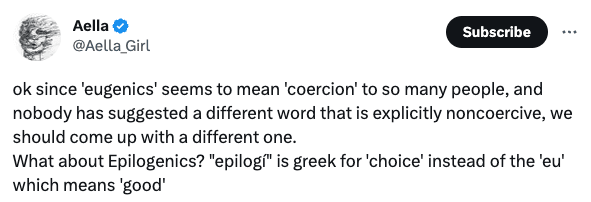I am conditionally in favor of human genetic augmentation. In particular, I think embryo selection for intelligence, health, happiness and other positive traits is desirable. When I bring this up with people, one of the most frequent questions is "Isn't that eugenics?"
I never know how to respond. The term "eugenics" has absorbed so much baggage over the last century that it somehow refers both to swiping right on Tinder when you see an attractive person and to the holocaust.
These are not similar concepts. The fact that we use a single word to refer to both is crazy. I cannot count the number of debates I've heard about human genetic engineering where the disagreement boils down to people misunderstanding what the other is advocating for. One person will talk about the benefits of improving the genes of future generations, and the other person will attack the idea because they mentally associate it with "eugenics", and to them that means "the holocaust" and "state sponsored sterilization of people with disabilities".
The fault lies with the term itself. It means so many different things to so many people that its use actively hinders understanding. For this reason, I think we should start using a new term to talk about non-coercive means of improving human genetics.
Epilogenics: non-coercive means of changing genetics
This term originated with Aella on Twitter, and I think it perfectly fits the purpose I have in mind.
Examples of epilogenics
- Selecting an embryo for lower disease risk, higher intelligence, or some other trait good for both the individual and society
- Gene editing for the purposes listed above
- Choosing an attractive spouse
Examples of things that are not epilogenics
- State-sponsored sterilization of people deemed “unfit”
- Rules against marriage of family members such a siblings and cousins
- Things people think of as eugenics even though they are often bad for genes (i.e. genocide)
I would encourage the use of this term to clarify the difference between genocide and screening one's embryos for desirable traits.

I encountered the 90 % of diagnosed down fetuses being aborted claim all over the internet many times, and digging it up, it seems to go back to an older European literature review (where it was specifically 92 %). https://obgyn.onlinelibrary.wiley.com/doi/10.1002/(SICI)1097-0223(199909)19:9%3C808::AID-PD637%3E3.0.CO;2-B
Current data and especially data for the US in particular (which I assume is your interest) is harder to assess - it isn't tracked everywhere. Found an article linking all this and trying to deduce them, and they ended up with significantly lower figures, more in the 65 % aborted ballpark (ballpark being the stressed term here) : https://lozierinstitute.org/new-study-abortion-after-prenatal-diagnosis-of-down-syndrome-reduces-down-syndrome-community-by-thirty-percent/#_edn but it is also a lot of guesswork, and outdated. It is complicated by the fact that your can lose a down pregnancy for other reasons, as well - and also by the fact that if you ask people if they hypothetically would abort for a positive they consider very unlikely, they answer much more in denial (23%-33%) than if you actually give them a positive test, at which point choosing to abort skyrockets to 89%-97%. https://onlinelibrary.wiley.com/doi/10.1111/j.1542-2011.2011.00109.x
Most recently, the case of Iceland made headlines, because it became apparent that the condition has essentially vanished there as a consequence of prenatal screening, which is strongly encouraged there. There is no explicit pressure to abort if your fetus has down syndrome, and you are given all the opportunities for an informed decision, and there are still some women who either refuse the screening, or keep the child anyway, so Iceland felt very misrepresented by most of the headlines, though their rebuttal didn't conclude final numbers - read like ballpark 85 % people screening, and for positive screens, ballpark 80-85 % of positives leading to abortions, though they left it deliberately ambiguous. As they felt misrepresented, here is their own presentation of the situation: https://icelandmag.is/article/fact-check-no-iceland-not-systematically-eradicating-down-syndrome Even that seemed to amount to only 1-3 kids still having it per year, so frankly, I get the "disappearing" accusation. Similar picture in Denmark.
On the other end of this, if you talk to parents who actually had kids with down syndrome (which often come as surprises, still - the tests are not perfectly accurate, and not everyone does them), you get a startlingly different picture: "Of the 2,044 respondents, 99% reported that they love their son or daughter; 97% were proud of them; 79% felt their outlook on life was more positive because of them; 5% felt embarrassed by them; and 4% regretted having them. The parents report that 95% of their sons or daughters without Down syndrome have good relationships with their siblings with Down syndrome. The overwhelming majority of parents surveyed report that they are happy with their decision to have their child with Down syndrome and indicate that their sons and daughters are great sources of love and pride." https://www.ncbi.nlm.nih.gov/pmc/articles/PMC3353148/#:~:text=The%20overwhelming%20majority%20of%20parents,sources%20of%20love%20and%20pride.
I do think though, that we can agree that the amount of people who abort when they are warned of it is much higher than the percentage of people who are unhappy they got their surprise down syndrome kid?
And that makes me wonder how many other conditions that would be true for. How many people would still select the embryo that is gay? I fear only very few. And would choosing against them make the world a better place? I doubt it.
"Eugenics" means "good genes". It was always intended as a good thing. The people who came up with it, and people independently have, many times, I do think they wanted a better world. Less poverty. Better health. Practically none began their efforts with force. And yet, there are so many historic examples that tried to implement it, which people think ended up in a very scary place.
If this article wants to rename eugenics because they think what they have now is totally different and safe and won't cause the same horrors in the long run, they need to explain why. Otherwise it is just a rebranding.